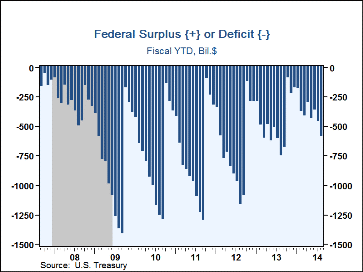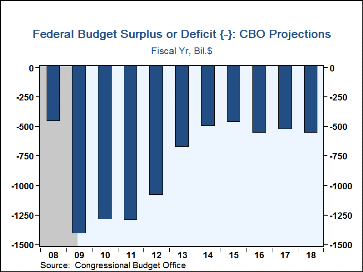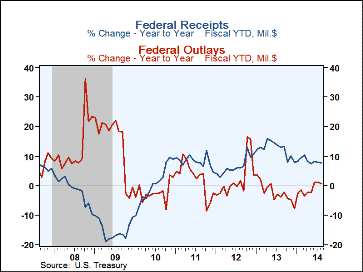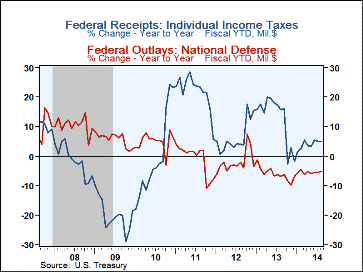 Global| Sep 11 2014
Global| Sep 11 2014U.S. Budget Deficit's Decline Continues
by:Tom Moeller
|in:Economy in Brief
Summary
The Federal Government posted a $128.7 billion budget deficit during August of FY 2014, and roughly matched expectations in the Action Economics Forecast Survey. For the first eleven months of the current fiscal year, the government [...]
The Federal Government posted a $128.7 billion budget deficit during August of FY 2014, and roughly matched expectations in the Action Economics Forecast Survey. For the first eleven months of the current fiscal year, the government ran a $589.2 billion deficit compared to $755.3 billion last year. It was the smallest budget deficit during the first eleven months of any fiscal year since 2008. For FY 2014, the Congressional Budget Office projects the budget deficit will total $506 billion, reduced from its earlier forecast of $583 billion; then it will fall to $469 billion in FY 2015.
Net revenues for this fiscal year-to-date increased 7.7% y/y with the firmer economy. Corporate income taxes increased 14.3% y/y while the improved labor market raised social insurance taxes by 8.4% y/y. Individual income taxes continued to rise an improving 4.9% y/y and excise taxes edged 0.2% higher y/y.
The smaller budget deficit in FY'14 also reflects a reduced 0.8% y/y increase in net outlays versus last year. Outlay growth was held back by a 5.1% y/y reduction in defense spending and a 4.6% y/y decline in income security outlays. To the upside, spending growth was boosted this year by an accelerated 13.0% y/y jump in health outlays, which include health services, research & training, and an 7.9% y/y rise in veterans benefits. Also increasing were social security outlays which gained a stable 4.6% y/y while Medicare spending declined 1.6% y/y. Reflecting the recent rise in interest rates, net interest payments rose 3.9% y/y.
Haver's basic data on Federal Government outlays and receipts, and summary presentations of the Budget from CBO are contained in USECON. Considerable detail is given in the separate GOVFIN database.
An Update to the Budget and Economic Outlook: 2014 to 2024 from the Congressional Budget Office is available here.
| US Government Finance | Aug | FY'13 | FY'12 | FY'11 | FY'10 | |
|---|---|---|---|---|---|---|
| Budget Balance | -- | $-128.7 bil. | $-680.3 bil. | $-1,089.2 bil. | $-1,296.8 bil. | $-1,294.2 bil. |
| As a percent of GDP | -- | -- | 4.1 | 6.8 | 8.4 | 8.8 |
| % of Total | YTD FY'14 | |||||
| Net Revenues (Y/Y % Change) | 100 | 7.7% | 13.3% | 6.4% | 6.5% | 2.7% |
| Individual Income Taxes | 47 | 4.9 | 16.3 | 3.7 | 21.5 | -1.8 |
| Corporate Income Taxes | 10 | 14.3 | 12.9 | 33.8 | -5.4 | 38.5 |
| Social Insurance Taxes | 34 | 8.4 | 12.1 | 3.2 | -5.3 | -2.9 |
| Excise Taxes | 3 | 0.2 | 6.3 | 9.2 | 8.2 | 7.1 |
| Net Outlays (Y/Y % Change) | 100 | 0.8 | -2.4 | -1.7 | 4.1 | -1.8 |
| National Defense | 18 | -5.1 | -6.3 | -3.9 | 1.7 | 4.6 |
| Education, Training, Employment & Social Services | 3 | 28.6 | -21.9 | -10.3 | -20.6 | 63.0 |
| Health | 10 | 13.0 | 3.1 | -7.0 | 1.0 | 10.4 |
| Medicare | 14 | -1.6 | 5.5 | -2.8 | 7.5 | 5.0 |
| Income Security | 16 | -4.6 | -1.1 | -9.1 | -4.1 | 16.7 |
| Social Security | 24 | 4.6 | 5.2 | 5.8 | 3.4 | 3.5 |
| Veterans Benefits | 4 | 7.9 | 11.5 | -2.0 | 17.3 | 13.6 |
| Interest | 6 | 3.9 | 0.4 | -3.0 | 15.8 | 2.9 |
Tom Moeller
AuthorMore in Author Profile »Prior to joining Haver Analytics in 2000, Mr. Moeller worked as the Economist at Chancellor Capital Management from 1985 to 1999. There, he developed comprehensive economic forecasts and interpreted economic data for equity and fixed income portfolio managers. Also at Chancellor, Mr. Moeller worked as an equity analyst and was responsible for researching and rating companies in the economically sensitive automobile and housing industries for investment in Chancellor’s equity portfolio. Prior to joining Chancellor, Mr. Moeller was an Economist at Citibank from 1979 to 1984. He also analyzed pricing behavior in the metals industry for the Council on Wage and Price Stability in Washington, D.C. In 1999, Mr. Moeller received the award for most accurate forecast from the Forecasters' Club of New York. From 1990 to 1992 he was President of the New York Association for Business Economists. Mr. Moeller earned an M.B.A. in Finance from Fordham University, where he graduated in 1987. He holds a Bachelor of Arts in Economics from George Washington University.
More Economy in Brief
 Global| Feb 05 2026
Global| Feb 05 2026Charts of the Week: Balanced Policy, Resilient Data and AI Narratives
by:Andrew Cates










